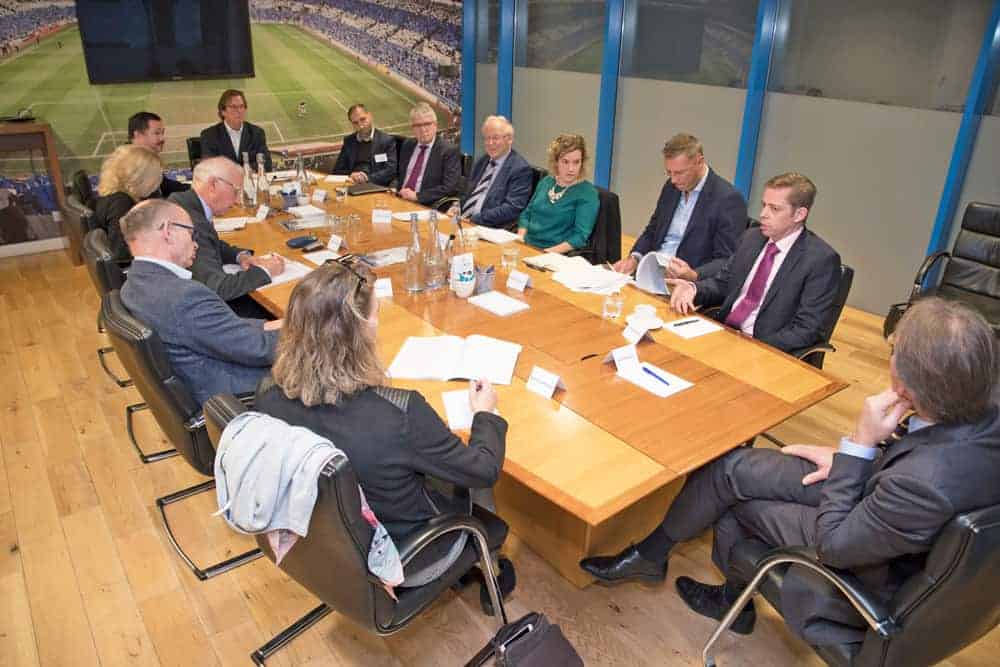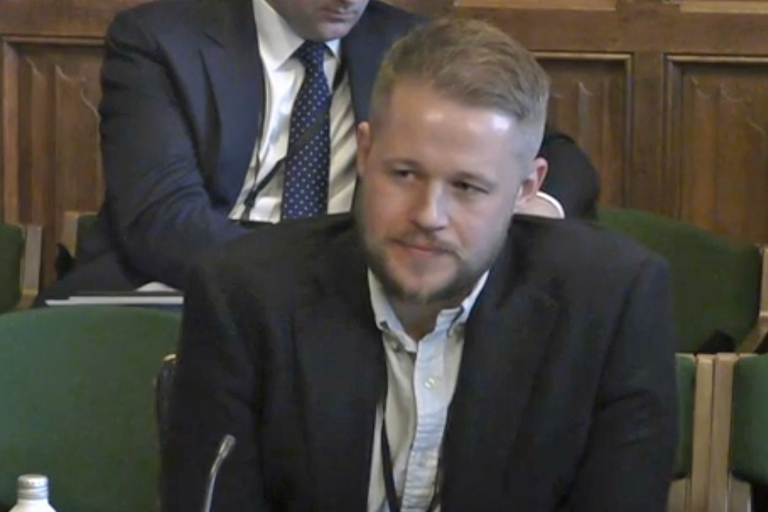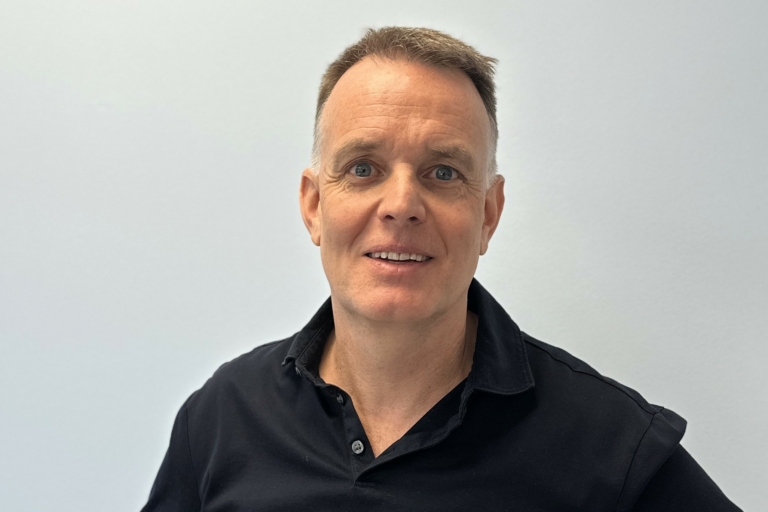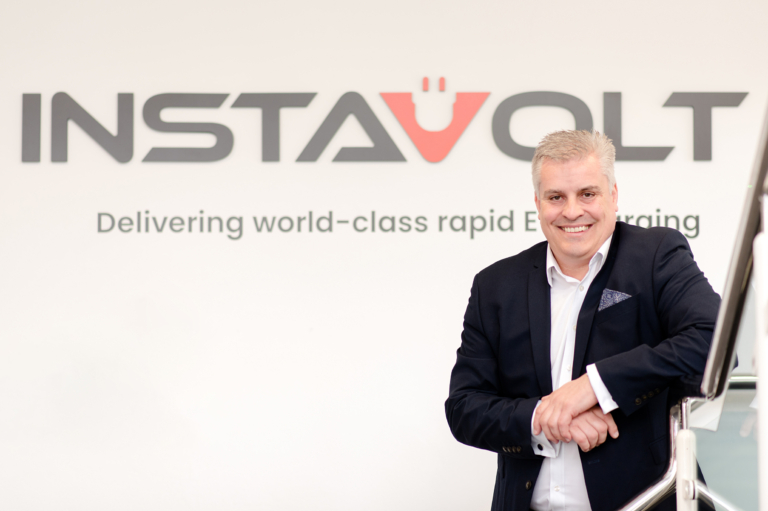Growth and how to achieve it

The Business Magazine hosted this Southern Technology 100 event with Barclays bank, intellectual property specialists Marks & Clerk, business advisers Moore Stephens, and specialist business and home insurers Hiscox. It was held at Marks & Clerk’s Oxford office. Tim Wickham reports on…
Participants
Lee Atkinson: Relationship director, Barclays
Marco Essomba: Founder and chairman, iCyber-Security Group
Simon Fahie: Managing director – global technology, Bybox
Nigel Kilpatrick: Sales director, Roc Technologies
Miles Hewitt-Boorman: Partner, Moore Stephens
Robert Lind: Partner, Marks & Clerk
Ben Neville: Head of group marketing, Prodrive
Damian Ryan: Partner, Moore Stephens
William Sachiti: Founder, Academy of Robotics
Terry Storrar: Director of managed services, MCSa (Maindec Computer Solutions)
Kevin Wilson: Managing director, AuDeo
David Murray: Managing director of The Business Magazine, chaired the discussion.
Coping in uncertain times
Simon Fahie from software company Bybox said one of his company’s challenges is adapting its processes as the organisation transitions through growth. “We are at the top of the tree in our sector, so our competitors’ main line of attack is on price. We are focusing on innovation, our ‘secret sauce’, and feel we are now at a transition point as our growth takes us global.”
Technology support and solutions provider MCSa was created from the merger of two companies and Terry Storrar said its focus is on moving from the traditional ‘break/fix’ fee-for-service model to one of ‘fix/break’. “We have concentrated on our existing customers, but now we must prove to new customers that we can offer value, which is difficult to do when you offer a service.”
For Nigel Kilpatrick at technology services provider Roc Technologies, it’s a case of listening to and tapping into what customers want. “That’s more important than just trying to do the same thing as everyone else.Organisations that keep doing today what was right 25 years ago are finding it very hard to adapt.. If you just throw money at problems you won’t survive.
“We are finding that large organisations often don’t want to go to larger consulting firms, where you get the same old thing and pay a high cost for it. This has allowed us to have a huge growth curve, based on trust and credibility.”
Innovate to stay ahead
The world of video conferencing has transformed in the past 20 years. Kevin Wilson from AuDeo noted: “Like a lot of technologies, you have to find the best way to do it. It’s a bit like going from vinyl records to CD. We are moving video conferencing to the cloud, delivered via desktop computers. In about nine out of 10 cases, if we can get in front of the customer then we can win the business. I am very hopeful for growth.”
Engineering group Prodrive’s Ben Neville said that while motorsport is still at the heart of its business, the company has successfully diversified into other sectors. “I agree with Simon about having a ‘secret sauce’; we offer innovative problem solving and can transpose what it takes to win the Le Mans 24-hour endurance race and apply it to yachting’s America’s Cup, electric vehicle design and the defence sector. Having a unique way of problem solving is a message that we communicate to the market and this positioning is an important way to differentiate yourself as the market moves to greater commoditisation.”
The Academy of Robotics is developing a driverless car to deliver goods to people. William Sachiti said they had just closed a fundraising round and are building a ‘street legal’ version of the vehicle.
“Computer chip manufacturers are combining resources to create a single open-source system for running driverless cars. My business is focusing on the ‘last mile’ of delivery – the biggest cost for most retailers is from the depot to your house – while companies like Tesla develop technology needed for city and motorway driving. We are creating a data set that we can sell for driving on unmarked roads and residential streets. We have built a nervous system for a car that reacts to things like rain or potholes in the road.
“Our technology is based on things that have never been done before, so scaling up the business is hard. But if we pitch it right, retailers will bite our arm off. We already have a lot of interest.”
Intellectual property service provider Marks & Clerk has seen sharp growth in work to support the development of driverless and electric cars. “This is a key area of focus for us. We are working with a lot of Thames Valley companies, as well as Scandinavian businesses” said Robert Lind.
Cyber security threats
Marco Essomba at iCyber-Security Group, talked about the risk of data being hacked. “The connectivity of infrastructure is an issue. The vendor landscape is very complex and clients can be confused.”
He didn’t think clients always knew how to approach the problem. “Cyber crime is a huge and growing threat. While developments like driverless cars are exciting, it’s also scary. Hackers are already investing in ways to attack the next stage of computer connectivity. Companies and governments need to take steps to protect data, which is where our company comes in.”
Storrar concurred that cyber security should be paramount in everyone’s minds. “Being able to recover from attacks is essential. User fallibility – human error – is an area we focus on with our clients.”
Miles Hewitt-Boorman from accountants Moore Stephens observed that his firm spends significantly on security to protect its clients’ data. “It’s a big challenge. We want our employees to spend time outside the office talking to clients, but we understand the importance of maintaining cyber security wherever our people are working.”
He added that there was a big divide between clients who take the data security threat seriously, and those who don’t. “We are also seeing larger firms that have built complex IT infrastructures finding they have holes in them, whereas smaller, younger companies that have grown up with IT as a key plank in their organisation are often better at cyber security.
“We are embedding in the thinking of our firm’s partners the fact that IT is fundamental to the way we deliver our services; cyber security is not an add-on, or luxury item.
Getting your cyber security right is as important as employing good people.”
Lee Atkinson from Barclays highlighted that he’s constantly reminding clients to update their web browser software. “We want to protect our clients from fraud so we are urging them at every opportunity to update their software – it’s just not safe for anyone to bank online with outdated systems. Cyber crime is one of the biggest business challenges of our generation and companies need to get real about the financial and reputational damage it can inflict.”
Essomba stressed how important it was to convince company executives to take cyber security seriously. “It’s about protecting your business and surviving. Cyber crime isn’t just about small-scale criminals working in a back room, it’s about nation versus nation, and business against business, trying to hack information. It is a challenge that is only going to grow until company boards and business leaders take it seriously. I think a big shift in attitude is on the way.”
Atkinson thought one problem was getting companies to act before it is too late. “Some businesses only take cyber crime seriously if they experience computer fraud and security breaches first hand and then it’s often too late. Firms must recognise the threat that cyber crime can pose to them, their reputation and subsequently their bottom line. Companies need to consider cyber security as critical to their business operation as cost or cashflow.”
Essomba: “What we need to do is show businesses the value of good cyber security, making them see how much protection they have and how much they can save as a result of having the right protection.”
Preparing for changes in data protection rules
The European Union’s General Data Protection Regulation (GDPR) comes into force in May 2018 and will affect the way businesses store and process personal data. It’s not just data protection and hacking that preoccupy Moore Stephens’ corporate finance clients, noted Damian Ryan. “A big concern is the internet itself, which will undergo massive transformation in the next 10 years. First we had the information superhighway, then social engagement on the internet, where people don’t own the data they put out there. Next will come ‘blockchain’ types of decentralisation of that information, where companies collect data but users have more control of it.
“Digital companies also face the question of trust, with so much fake news, fake audiences and face user traffic out there. Engendering trust won’t be an overnight thing, but whatever the next phase is, trust has a large part to play.”
Kilpatrick agreed about the significance of the question of who owns data. “This will change over the next 10 to 15 years. Customers will tell us what information they want to give us.”
Ryan: “Once customers understand the value of the data they are handing over, they will want more control over it.”
Kilpatrick: “Data ownership will have an impact on the ‘internet of things’ that connects everyday technology to the cloud. It’s not about privacy but about consumer rights. In a way, things are about to change for the better for consumers but for the worse for businesses. It will be a big operational change, where no business will be unaffected by issues of privacy of data.
“You only have to think about things like CCTV capturing images of people, or when you visit a building and give personal information when you sign in. And as Marco pointed out, people don’t understand the problem.
We are finding companies struggling to understand what cyber crime means.
And we are seeing an uptake in cyber insurance, which is another huge area.”
Essomba noted that businesses would only start to listen when regulation has bite, with fines and legal liabilities for directors. “That means we have to bring IT security to company boards. Giving control of data back to users will change the game completely as their consent and agreement will be needed.”
Neville didn’t think stopping employees using social media for work purposes was necessarily the right way to try and protect companies from hacking. “A knee-jerk reaction to the cyber crime threat is to lock down everything. Yes, you need to protect your intellectual property, but the key to what makes our company different is being visible and not being too risk averse. We don’t want to stop our employees using social media, as that cuts off an avenue of communication and the benefit of viral marketing.”
Sachiti picked up on Neville’s observation about companies blocking access. “We find that some big technology companies won’t accept documents as attachments in emails. This is because their systems have to be the same as those of their insurer in order to get cover, but that can mean they might not be able to receive documents you want to send if your systems don’t meet their security requirements.”
Companies face similar cyber security challenges using video conferencing, but attitudes appear to be slightly more favourable about the way data is being protected, thought Wilson. “In the past three years, there has been a massive change in attitude by many companies, who now accept that data kept outside their organisation can be safe and that security in the cloud is effective.”
Lind observed: “Marks & Clerk has always focused on securing data, especially around patents and intellectual property. Sometimes we think we are an IT firm we have so much focus on internet and data security.”
Improving online security
The discussion returned to the hot topic of cyber security and how businesses can protect themselves.
Wilson: “Evolution is inevitable. We have to come up with fixes to prevent the wrong kind of access. You can compare it to installing anti-virus software.”
Essomba: “We are now talking about states involved in cyber crime. It’s not just kids. We will be casualties if states attack companies.”
Neville: “Is this part of the classic evolution of technology in industry? Where security eventually becomes invisible because everyone has to have cyber protection?”
Essomba: “Absolutely. We see security as an enabler. It should be seamless, embedded and integrated into a business.”
Hewitt-Boorman: “And good data security enables you to do more with your business.”
Essomba thought the cost of cyber insurance could be high and Wilson was concerned that having insurance cover might encourage companies to take unnecessary risks with their data.
Sachiti added that protecting systems from human flaws is a massive problem.
Essomba agreed that humans are still the biggest liability to protecting data.
How to attract and retain talent in the tech sector
Another key challenge companies in the region face is difficulty recruiting the right people.
Fahie: “We often find competition comes at the job offer stage. Candidates will ‘Dutch auction’ their skills looking for the best offer. We put effort into finding and interviewing people, and offering them jobs, then they join someone else. This is where your company culture and ‘softer’ elements come into play. We also need to look more at apprenticeships. For example, young people thinking they don’t want to incur debts by studying at university might see apprenticeships as a route in.”
Storrar emphasised the benefits of developing skill and knowledge within the company and passing it on. “We have a natural progression through the business. We find that you can teach people technology but not personality, so finding the right type of people who we can train is essential.”
For Kilpatrick, apprenticeships are a good long-term investment but can’t always help with the immediate skills shortage. “The pain is here and now, for example, the lack of good sales people in the region is shocking. We found someone who was right for us but they were based in Leeds – we had to open an office there so we could hire them. It used to be easier.”
Storrar pointed to a ‘footballer mentality’, where younger people expect high rewards. “Getting someone excited about your business is hard, and people aren’t always eager to succeed.”
Atkinson: “An additional issue is whether businesses should get the sales in first, then find the staff which can lead to poor service if understaffed, or do it the other way around which adds to cost before the sales come in. It’s a balancing act, even more so in the IT industry because it can be a challenge hiring the right skilled staff quickly.”
Neville: “Look at the companies that do recruitment well, like Google and Apple. They tend to recruit straight from education. I think doing that relies on your reputation, where people have an aspiration to work for your brand. The principle can be the same for both big and small companies. Talent in areas like artificial intelligence is pooling outside the UK. We need to propagate homegrown talent. Being innovative is a great way we can get people queuing at our door. But we need to work hard to communicate to new recruits why our culture is relevant to them.”
Hewitt-Boorman: “People want to join a firm that is growing. Tell them how they can make a difference and get them involved in different sides of the business. We are strong believers in apprentices and coaching – and we know employees might look externally to develop their careers. The days of joining a firm for life are long gone.”
Ryan: “Recruitment is a challenge in the Thames Valley. There is a perception that everything is in London.”
Fahie: “You have to focus on quality of life issues. There is a trend among some millennials that they will work for a period and then do something else, before returning to a job again. That makes it hard for companies if they think someone will only be with them for a limited time.”
Shape of things to come
The panel ended the session by sharing views on whether they thought working life today is more stressful than in the past. Fahie felt millennials were generally happier. Sachiti questioned what might happen if machines became so efficient, and using them so profitable, that humans were left wondering what they are here for. Essomba pointed out that the development of intelligent machines would have to be regulated. Ryan ended the discussion with the light-hearted observation that he had recently read a list of ‘20 jobs in the future’ that featured the role of space tourist guide.













